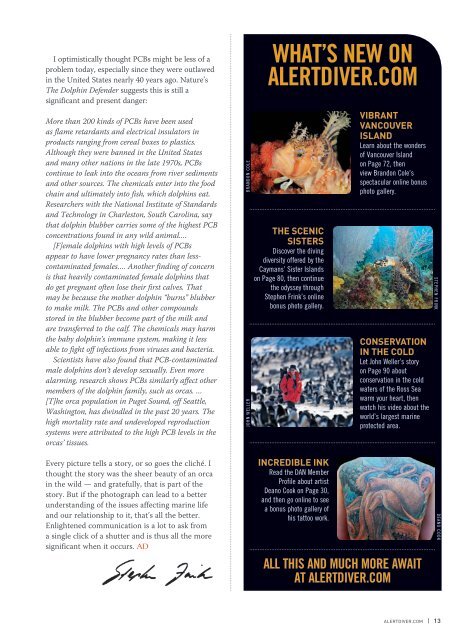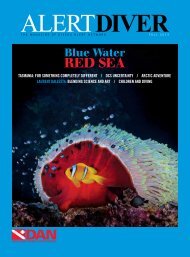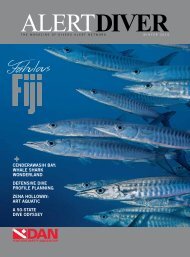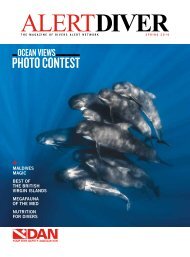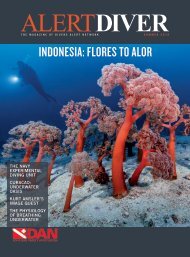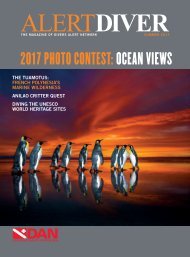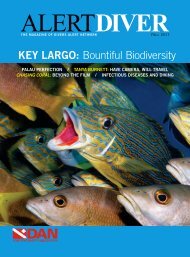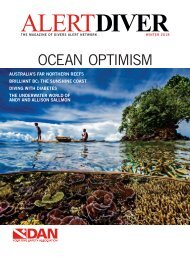AD 2017 Q1
Alert Diver is the dive industry’s leading publication. Featuring DAN’s core content of dive safety, research, education and medical information, each issue is a must-read reference, archived and shared by passionate scuba enthusiasts. In addition, Alert Diver showcases fascinating dive destinations and marine environmental topics through images from the world’s greatest underwater photographers and stories from the most experienced and eloquent dive journalists in the business.
Alert Diver is the dive industry’s leading publication. Featuring DAN’s core content of dive safety, research, education and medical information, each issue is a must-read reference, archived and shared by passionate scuba enthusiasts. In addition, Alert Diver showcases fascinating dive destinations and marine environmental topics through images from the world’s greatest underwater photographers and stories from the most experienced and eloquent dive journalists in the business.
You also want an ePaper? Increase the reach of your titles
YUMPU automatically turns print PDFs into web optimized ePapers that Google loves.
I optimistically thought PCBs might be less of a<br />
problem today, especially since they were outlawed<br />
in the United States nearly 40 years ago. Nature’s<br />
The Dolphin Defender suggests this is still a<br />
significant and present danger:<br />
More than 200 kinds of PCBs have been used<br />
as flame retardants and electrical insulators in<br />
products ranging from cereal boxes to plastics.<br />
Although they were banned in the United States<br />
and many other nations in the late 1970s, PCBs<br />
continue to leak into the oceans from river sediments<br />
and other sources. The chemicals enter into the food<br />
chain and ultimately into fish, which dolphins eat.<br />
Researchers with the National Institute of Standards<br />
and Technology in Charleston, South Carolina, say<br />
that dolphin blubber carries some of the highest PCB<br />
concentrations found in any wild animal.…<br />
[F]emale dolphins with high levels of PCBs<br />
appear to have lower pregnancy rates than lesscontaminated<br />
females…. Another finding of concern<br />
is that heavily contaminated female dolphins that<br />
do get pregnant often lose their first calves. That<br />
may be because the mother dolphin “burns” blubber<br />
to make milk. The PCBs and other compounds<br />
stored in the blubber become part of the milk and<br />
are transferred to the calf. The chemicals may harm<br />
the baby dolphin’s immune system, making it less<br />
able to fight off infections from viruses and bacteria.<br />
Scientists have also found that PCB-contaminated<br />
male dolphins don’t develop sexually. Even more<br />
alarming, research shows PCBs similarly affect other<br />
members of the dolphin family, such as orcas. …<br />
[T]he orca population in Puget Sound, off Seattle,<br />
Washington, has dwindled in the past 20 years. The<br />
high mortality rate and undeveloped reproduction<br />
systems were attributed to the high PCB levels in the<br />
orcas’ tissues.<br />
BRANDON COLE<br />
JOHN WELLER<br />
WHAT’S NEW ON<br />
ALERTDIVER.COM<br />
THE SCENIC<br />
SISTERS<br />
Discover the diving<br />
diversity offered by the<br />
Caymans’ Sister Islands<br />
on Page 80, then continue<br />
the odyssey through<br />
Stephen Frink’s online<br />
bonus photo gallery.<br />
VIBRANT<br />
VANCOUVER<br />
ISLAND<br />
Learn about the wonders<br />
of Vancouver Island<br />
on Page 72, then<br />
view Brandon Cole’s<br />
spectacular online bonus<br />
photo gallery.<br />
CONSERVATION<br />
IN THE COLD<br />
Let John Weller’s story<br />
on Page 90 about<br />
conservation in the cold<br />
waters of the Ross Sea<br />
warm your heart, then<br />
watch his video about the<br />
world’s largest marine<br />
protected area.<br />
STEPHEN FRINK<br />
Every picture tells a story, or so goes the cliché. I<br />
thought the story was the sheer beauty of an orca<br />
in the wild — and gratefully, that is part of the<br />
story. But if the photograph can lead to a better<br />
understanding of the issues affecting marine life<br />
and our relationship to it, that’s all the better.<br />
Enlightened communication is a lot to ask from<br />
a single click of a shutter and is thus all the more<br />
significant when it occurs. <strong>AD</strong><br />
INCREDIBLE INK<br />
Read the DAN Member<br />
Profile about artist<br />
Deano Cook on Page 30,<br />
and then go online to see<br />
a bonus photo gallery of<br />
his tattoo work.<br />
ALL THIS AND MUCH MORE AWAIT<br />
AT ALERTDIVER.COM<br />
DEANO COOK<br />
ALERTDIVER.COM | 13


